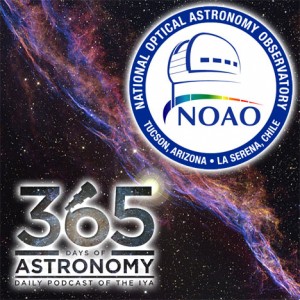Podcaster: Rob Sparks ; Guests: Gautham Naryan
 Title: Two Types of Supernova and Dark Energy
Title: Two Types of Supernova and Dark Energy
Organization: NOAO
Links: www.noao.edu ; @NOAONorth; http://www.gemini.edu/; https://www.facebook.com/GeminiObservatory
Description: Type 1a supernova led to the Nobel Prize winning discovery of dark energy in the 1990s’. However, they still hold many mysteries that astronomers are unraveling today. In this podcast, Dr. Guatham Narayan talks about a recent paper he co-authored where they discovered two different types of type 1a supernova and the implications this research has for dark energy.
Bio: Rob Sparks is a science education specialist in the Education and Public Outreach (EPO) group at the National Optical Astronomy Observatory (NOAO) and works on the Galileoscope project (www.galileoscope.org), providing design, dissemination and professional development. He blogs at halfastro.wordpress.com.
Gautham Naryan a postdoc at the National Optical Astronomy Observatory working on establishing a network of faint fundamental spectrophotometric standards for future wide-field surveys such as Pan-STARRS and LSST, and studying exploding stars near and far.
He was a graduate student in the Department of Physics and the Center for Astrophysics at Harvard University, working for Prof. Christopher Stubbs.
His research interests are in cosmology – he has been working with light curves of type Ia supernovae to measure the equation of state of the dark energy with the ESSENCE project. He has worked on modeling SNIa light curves using low-redshift measurements from Prof. Robert Kirshner’s SN Group at the CfA, and other nearby SN search programs. Dr. Narayan is actively involved in cosmological investigations with variables and explosive transients with Pan-STARRS, particularly if they are SNIa that look funny. He works on pipelines for transient searches, HPC codes, larger than the average simulations, and try to observe as much as he can.
End of podcast:
365 Days of Astronomy
=====================
The 365 Days of Astronomy Podcast is produced by NUCLIO. Audio post-production by Richard Drumm. Bandwidth donated by libsyn.com and wizzard media. You may reproduce and distribute this audio for non-commercial purposes. Please consider supporting the podcast with a few dollars (or Euros!). Visit us on the web at 365DaysOfAstronomy.org or email us at info@365DaysOfAstronomy.org. This year we celebrate cosmic light as light is our info messenger in the universe. Join us and share your story to celebrate the International Year of Light. Until tomorrow! Goodbye!

